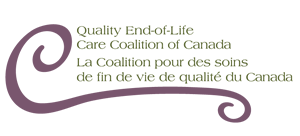
(December 18, 2020, Ottawa, ON) – Many Canadians are experiencing grief due to the loss of their loved ones, but for a lot of us, grief also stems from the loss of our normal pre-COVID lifestyle and the loss of human contact. The Quality End-of-Life Care Coalition of Canada (QELCCC) would like to bring this discussion to the forefront of Canadians’ minds, and support Canadians as they grieve this holiday season.
QELCCC supports and normalizes the conversation that grief and bereavement is a part of life. The Coalition encourages Canadians to share their stories. In addition, the Coalition is proud to provide a list of resources and tools to help Canadians throughout their grief journeys.
“The holiday season can be a particularly hard time of year for people mourning the loss of someone they love and the added loss of connections as a result of the pandemic can compound that grief,” says Helena Sonea, Senior Manager, Advocacy at the Canadian Cancer Society and Chair of the Advocacy Committee at the Coalition. “It can help to find ways to connect with others virtually, to talk about the grief you’re experiencing and to access resources that help you sort through the grieving process. Most importantly, know that you are not alone, and that support is available.”
The Canadian Hospice Palliative Care Association (CHPCA) serves as the Secretariat for the Quality End-of-life Care Coalition of Canada. Sharon Baxter, Executive Director, CHPCA, and member of the Coalition Executive Committee says, “grieving is hard work under normal circumstances, and the pandemic has made normal bereavement very challenging. The COVID-19 pandemic has disrupted the way we are able to grieve, mourn and receive support.”
Grief is a natural, normal and necessary journey when a loved one passes away. “We all handle bereavement and grief differently and helping Canadians understand this would go a long way to improving the end of one’s life for dying Canadians, their family caregivers and other loved ones” added Sharon Baxter.
Everyone grieves differently. This is apparent when looking at the differences in grief patterns across the gender spectrum. Gender norms and expectations may impact the manner in which people cope.
Although life changing and at times overwhelming, most people successfully make their way through grief. Current research indicates that only 2-3% of people worldwide will experience a disabling form of grief known as complicated or prolonged grief[1].
If you are struggling this holiday, the Quality End-of-Life Care Coalition of Canada is thinking of you and hope you can find peace this holiday season. At this trying time, we might be physically distant, but we are emotionally, spiritually and socially connected through our grief.
About the Quality End-of-Life Care Coalition of Canada (QELCCC)
The Quality End-of-Life Care Coalition of Canada (QELCCC) is a group of 35 national organizations dedicated to improving palliative care for all Canadians. The Coalition believes that all Canadians have the right to quality hospice palliative care. To achieve this, there must be a well-funded, sustainable national strategy for hospice palliative care. It is the mission of the QELCCC to work together in partnership to achieve this goal.
For media enquires:
Aia Raafat
Communications Officer
Canadian Hospice Palliative Care Association (CHPCA)
Phone: (613) 241-3663 Ext 231
Email: [email protected]
[1] Carmassi C., Bertelloni C.A., Dell’Osso L. (2018) Grief Reactions in Diagnostic Classifications of Mental Disorders. In: Bui E. (eds) Clinical Handbook of Bereavement and Grief Reactions. Current Clinical Psychiatry. Humana Press, Cham. https://doi.org/10.1007/978-3-319-65241-2_14
